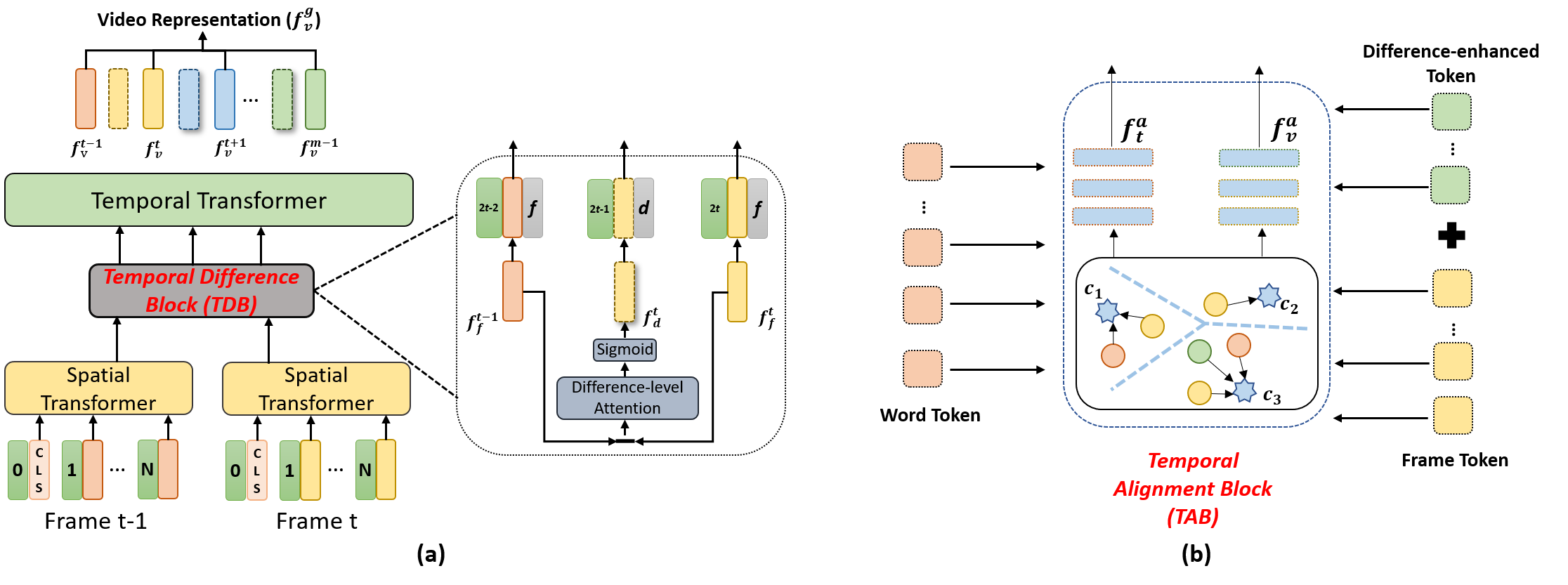The implementation of paper CLIP2Video: Mastering Video-Text Retrieval via Image CLIP.
CLIP2Video is a video-text retrieval model based on CLIP (ViT-B/32), which transfers the image-language pre-training model to video-text retrieval in an end-to-end manner. Our model involves a Temporal Difference Block to capture motions at fine temporal video frames, and a Temporal Alignment Block to re-align the tokens of video clips and phrases and enhance the multi-modal correlation. We conduct thorough ablation studies, and achieve state-of-the-art performance on major text-to-video and video-to-text retrieval benchmarks, including new records of retrieval accuracy on MSR-VTT, MSVD and VATEX.
This is the source code of CLIP2Video, a method for Video-Text Retrieval based on temporal correlations. It is built on top of the CLIP4Clip by ( Huaishao Luo et al.) in PyTorch.
pip install -r requirements.txt
Supported public training sets:
- MSR-VTT(9k)
- MSR-VTT(full)
- MSVD
- VATEX-English Version
Supported public testing protocols:
- MSR-VTT 1k-A protocol (SOTA)
- MSR-VTT full protocol (SOTA)
- MSVD(SOTA)
- VATEX-English version(SOTA)
Download official video: Official videos of different data can be found as follows:
Pre-process
To train and test the above datasets: you should use sample_frame.py to transform video into frames.
python sample_frame.py --input_path [raw video path] --output_path [frame path]
(Optional) The splits and captions can be found in the links of used dataset. For the convenience, you can also use the split in data/ directly.
Download CLIP model
To train and test the above datasets based on pre-trained CLIP model, you should visit CLIP and download ViT-B/32.
We provide three models trained on MSVD, MSR-VTT and VATEX-English.
| Model Name | checkpoint |
|---|---|
| CLIP2Video_MSVD | link |
| CLIP2Video_MSRVTT9k | link |
| CLIP2Video_VATEX | link |
To test the trained model, please refer test/.
(Optional) If the path of trained model(--checkpoint) doesn't exist, the parameters of basic CLIP (--clip_path) will be loaded.
T2V:
| Protocol | R@1 | R@5 | R@10 | Median Rank | Mean Rank |
|---|---|---|---|---|---|
| MSVD | 47.0 | 76.8 | 85.9 | 2 | 9.6 |
| MSRVTT-9k | 45.6 | 72.6 | 81.7 | 2 | 14.6 |
| MSRVTT-Full | 29.8 | 55.5 | 66.2 | 4 | 45.5 |
| Vatex (English) random 1k5 split | 57.3 | 90.0 | 95.5 | 1 | 3.6 |
| Vatex (English) HGR split | 61.2 | 90.9 | 95.6 | 1 | 3.4 |
V2T:
| Protocol | R@1 | R@5 | R@10 | Median Rank | Mean Rank |
|---|---|---|---|---|---|
| MSVD | 58.7 | 85.6 | 91.6 | 1 | 4.3 |
| MSRVTT-9k | 43.5 | 72.3 | 82.1 | 2 | 10.2 |
| MSRVTT-Full | 54.6 | 82.1 | 90.8 | 1 | 5.3 |
| Vatex (English) random 1k5 split | 76.0 | 97.7 | 99.9 | 1 | 1.5 |
| Vatex (English) HGR split | 77.9 | 98.1 | 99.1 | 1 | 1.6 |
(Optional:) Clarification of different results in VATEX:
-
In our paper, we do not strictly follow HGR's split, but randomly split the test set by ourselves, which is the split in
- data/vatex_data/test1k5_sec_list.txt
-
In HGR split, we adopt the totally same split following HGR, and the split can be seen as:
- data/vatex_data/test_list.txt
- data/vatex_data/val_list.txt
We will revise the results strictly following HGR split for fair comparison in the paper later!
If you find CLIP2Video useful in your work, you can cite the following paper:
@article{fang2021clip2video,
title={CLIP2Video: Mastering Video-Text Retrieval via Image CLIP},
author={Fang, Han and Xiong, Pengfei and Xu, Luhui and Chen, Yu},
journal={arXiv preprint arXiv:2106.11097},
year={2021}
}
Some components of this code implementation are adopted from CLIP and CLIP4Clip. We sincerely appreciate for their contributions.

